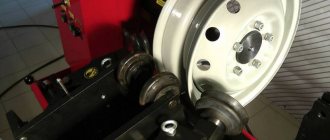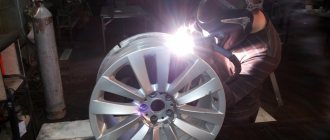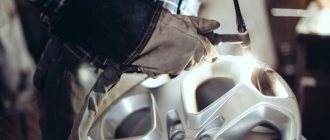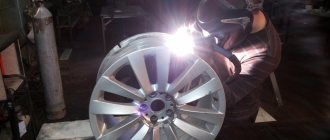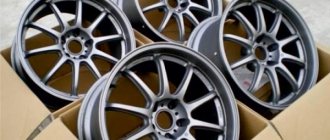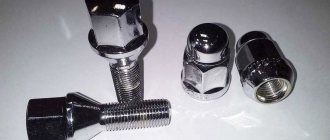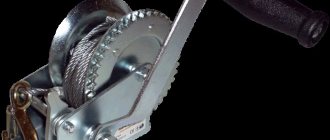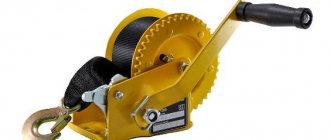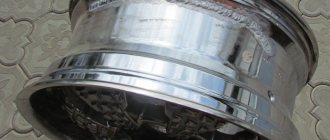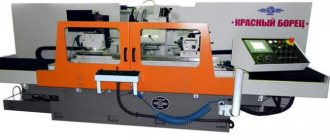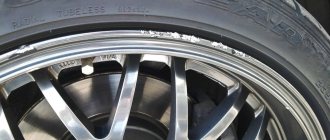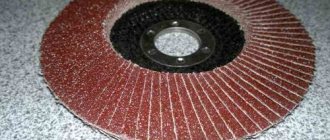DIY alloy wheel repair
Every vehicle owner prefers cast wheels when choosing wheels. They give the car a more respectable look and come in many varieties of shapes and patterns. Unfortunately, alloy wheels are more susceptible to deformation and chipping. To do this, just one blow and falling into the hole is enough - it can completely burst. But you shouldn’t be immediately disappointed in such discs. Their integrity in most cases depends on the speed of the vehicle and the terrain. You can straighten alloy wheels of any complexity by turning to specialized service stations for help or doing it yourself.
Disk before and after repair
Drivers should not forget that they always need to be on alert on our roads, especially in new regions and areas. Potholes and potholes on the asphalt can be found in the most unexpected places. Of course, a wide variety of situations can arise. To avoid a more serious accident, sometimes you have to sacrifice your alloy wheels. And if you do notice cracks, chips or an irregular shape, the question immediately arises, what to do now? In this case, there are two options to solve this problem:
- Purchasing new disks.
- Repair them at a service station.
- Self-correction of a damaged alloy wheel.
Types of damage and malfunctions of an alloy wheel
Due to the condition of our roads, even the most experienced motorist can accidentally hit a hole or pothole. This will lead to deformation and cracking of the cast disc. The most common disk failures are:
- cracks;
- scratches;
- chips;
- dents.
If you do not pay attention to the damage in time and do not fix it, this can lead to complete failure of the disk, corrosion, and further repairs will simply be useless.
Damaged disk
There are also damages that are simply impossible to repair - these are chips and cracks in the hub area. And even experts strongly recommend not to try to correct this type of damage, but to send the disk for scrap. Unqualified repairs can lead to an accident and further disastrous consequences. Changing shape and geometry is also a serious problem that is very difficult to correct. In such cases, professionals also advise refusing repairs and further use.
wheel balancing
Disc damage affects wheel balancing.
According to technical regulations, the maximum deviation should not exceed 0.5 mm, both in the axial and radial directions. If the indicators are higher, you will feel a beat on the steering wheel while driving even on a perfectly flat road. Disc damage affects wheel balancing. According to technical regulations, the maximum deviation should not exceed 0.5 mm, both in the axial and radial directions. If the indicators are higher, you will feel a beat on the steering wheel while driving even on a perfectly flat road.
If the dent is large, the rolling procedure takes two or more hours. To speed up the process, would-be craftsmen heat the dent site with a blowtorch. This should not be done under any circumstances. The fact is that a cast disk has a solid metal structure, and local heating will destroy this structure much more than rolling a “cold” disk. In places of heating, strong metal stresses will arise. If in the future the stress point falls into a hole, especially with sharp edges, this will provoke the destruction of the disk, which, in turn, can lead to a serious accident.
Argon welding
If there is a strong impact, cracks may form on one or more arms of the disc. But let’s say the driver decided to stop in time and check for damage to the wheel. I noticed a crack and installed a spare tire. Now you need to decide what to do with the damaged disk: throw it away or try to repair it?
Methods for repairing alloy wheels
Today, alloy wheels can be repaired in several ways:
Now let's look at each type of repair separately.
Welding is the most common and simplest repair method. With its help, an experienced specialist can eliminate many problems. As a rule, such repairs do not last long, and after several months of driving the driver again experiences problems while driving. Also, the manufacturer itself does not recommend heat treatment - subsequently the disk will change its shape and geometry. Accordingly, when operating a car with such discs, you may get into an accident or become the culprit. Therefore, it is worth considering how much it will cost you to buy a new car or major repairs if you save on purchasing a new set of alloy wheels.
Welding process of a damaged cast disk
Rolling (straightening) is used for minor damage and dents. The rolling method and equipment can be used the same as for steel. The only exception is thermal treatment. As was said earlier, alloy wheels should never be heated. This process also does not involve large financial expenses. But before you take your car to a service station, it is better to find out how much it costs to roll a cast wheel.
Disc before and after straightening
Manual editing is the easiest and most affordable way to restore car wheels, which you can do yourself. To level out the dents, we will need a hammer, sledgehammer and hydraulic jack. Before straightening, you should evaluate how many times and with what force it is necessary to hit the damaged area so that the disc acquires its original shape. If you don't calculate your strengths, you can only make the situation worse.
It is also possible to partially deposit metal on damaged areas using argon welding. After surfacing is completed, the excess metal is cut off, and you get your disk without cracks or scratches.
Repair of alloy wheels should end with the painting process. If you find stains that won't wash off or clean up, you can be sure that your disc has either been heated or used some other heat treatment, which is not acceptable for this type of material. You can carry out the painting process yourself in your garage. To do this, you will need several cans of paint, a degreaser, masking tape and protective equipment (gloves and a respirator). Initially, the discs are removed from the car, thoroughly cleaned and wiped. After this, the paint is applied in even layers over the entire surface.
In conclusion, I would like to say that repairing alloy wheels with your own hands is quite possible, but the only taboo is their heat treatment - it is unacceptable.
To protect yourself, your loved ones and your car, it is better not to skimp on purchasing a new set of wheels. But in case of minor chips and scratches, you can remove these defects yourself or seek help from specialists.
Straightening a wheel rim - a sledgehammer to help
A headache for car enthusiasts are roads in the pseudo-Japanese style “ToYamaToKanawa”. The result of a trip along such a road, and even disguised by puddles after the rain, is very deplorable. Bent rims are the smallest problem that can happen on a track like this. We can say that we got off easy. In spring and autumn, wheel rim straightening is on the agenda.
Some car enthusiasts do not consider it necessary to fix bent wheels and throw them away immediately. This is also a reasonable approach. A severely bent disk, even in a car service after rolling, can be even more damaged: microcracks will appear, from which, if the wheel is hit again or in the cold, the disk can simply crumble. In this case, even welding will not help.
If you are determined to straighten the disc, you can always contact the service. But if the disc deformation is small, welding is not required, there is absolutely little money to buy a new disc, and there is more than enough strength, you can carry out this procedure in your own garage.
Straightening a bent alloy wheel - procedure
- We will need: a jack, some kind of weight, a hammer, a sledgehammer, water.
- First, remove the damaged wheel. We will lift the car using a jack. Remove the wheel from the mounts. The damage to the disc is minor, so removing the tire is not necessary.
- Place the wheel on a horizontal surface. It will be more effective on the floor, since you will have to place a heavy load on top of the wheel. Otherwise, powerful blows with a sledgehammer will cause the wheel to throw and jump.
- The wheel is pressed to the floor. First, we perform “rough” straightening. You need to straighten the dented area on the disk with a sledgehammer. This is very difficult to accomplish, because a cast disc is difficult to process. You have to put in a lot of effort to achieve results.
- Next, take a hammer and place it on the edge of the rim along the inside of the disc. We use a sledgehammer to hit the hammer, carefully correcting rough work defects. We perform these actions until the rim takes the shape of a regular circle.
- You also have to find out if the tire is leaking water. You need to pour water on the wheel and monitor the condition. If there are bubbles on the surface of the wheel, there is only one conclusion - depressurization. We straighten the disc with a hammer until the bubbles disappear. There are no bubbles, which means that the procedure for straightening the wheel is completed and you can mount it in place.
stamped disc
A stamped disc is easier to restore than a cast one.
That is why the prices for repairing such wheels are lower. A stamped disc is easier to restore than a cast one. That is why the prices for repairing such wheels are lower.
Approximate prices for rolling rims in Moscow, rub.
| Diameter, inches | Stamped _ | Cast |
| 13 | 400 | 600 |
| 14 | 500 | 700 |
| 15 | 600 | 900 |
| 16 | 700 | 1100 |
| 17 | 800 | 1300 |
| 18 | 900 | 1500 |
| 19 | 1000 | 1700 |
If the cast disc is slightly bent and can be balanced with additional weights, rolling may help. It will give the disk its original perfectly round shape. Plus, there will be fewer weights on the wheel. Universal weights are glued to the inside of the disk. In winter, with frequent temperature changes or when washing wheels under high pressure, the adhesive tape may not hold up and the load will fall off. And this will affect the wheel balancing. Let's not forget that air can escape from the tire through a small dent on the sidewall of the rim. Rolling will remove small dents. The whole process will take no more than an hour.
Restoring alloy wheels: how effective is it?
Every car owner at least once in his life is faced with the need to buy rims. Such a need may arise from a breakdown, a desire to change the design of your car, or the need to replace a set of tires. At the same time, one question always arises: what is so good about alloy wheels, and how they can be repaired if necessary.
The appearance of alloy wheels is an order of magnitude better than that of competitors.
Types of disk straightening machines
Choosing a wheel for a modern car is not an easy task. Discs are made from various alloys and materials, and they also have different designs and patterns. Therefore, you need to choose a disc straightening machine wisely. There are such types of fossil machines:
- For straightening discs made of steel alloys;
- For straightening light alloy wheels;
- For discs made of non-ferrous metals;
- For repairing the "eight";
- Stands for repairing truck wheels.
According to the principle of operation, machines are divided into mechanical and hydraulic. Mechanical, in turn, are used to eliminate such damage:
- Runouts along the radius and axis;
- Ellipticity;
- Shallow dents;
- Correcting the rubber seat.
Why do car owners most often choose alloy wheels?
Today you can find a huge number of types of products on the car market. It is worth noting that the durability, reliability and other properties of disks depend primarily on the material from which they are made. One name - alloy wheels - can say a lot about this product.
If funds allow, then it is recommended to buy alloy wheels. The manufacturing technology of this wonderful product is as follows: an easily flowing material is poured into the finished mold using the classical casting method. Thanks to this manufacturing technology, the boundary between the disc and the rim is practically absent - this fact significantly increases the durability and reliability of cast wheels.
Surprisingly, such wheels are rarely damaged, since their deformation limit is much higher than that of other types of wheels. It will take at least five direct hits to the wheel for it to be damaged, but you must admit that, as a rule, no one has encountered such a situation.
Do you want to restore the appearance of your interior? Find out how to remove scratches on plastic yourself.
What to do if the battery terminals oxidize and how to avoid this problem in the future - see here.
If you are interested in knowing what the advantage of such wheels is, pay attention to these points:
- Small mass.
- Suspension durability.
- With such discs, the ride becomes very comfortable, and the car runs smoothly.
- Economical.
- Alloy wheels are not subject to corrosion.
- The advantage of such wheels is also the precision of manufacturing. This, by the way, is very important, since the quality of driving directly depends on this indicator.
Using different types of machines
Using a hydraulic stand, a technician can restore almost any dent or defect. There are times when it is necessary to use hydraulic and mechanical equipment .
For steel wheels
During the straightening process of steel disks, the damaged part is rolled through pressure rollers. The disc is placed on the shaft, and rollers act on the distorted areas at the required angle for alignment.
The universal flange is attached to the tip of the shaft, then the wheel is put on and secured with a nut. If the wheel has several holes, then each hole must be put on the flange. Deformed fastening holes are centered using conical nuts. The electric motor is located in the lower part of the frame, connected to a gearbox and V-belt drive. The tension of the V-belt drive is also controlled by a nut. On such a stand it is possible to roll deformed wheels with sizes from 10 to 15 inches.
For alloy wheels
Now alloy wheels are very popular both among young people and among S-class cars. These discs look very impressive, they are light and durable. They can be insidious and cast .
Cast ones are restored very simply: pressure is applied to the damaged area using a hydraulic booster. Forged rims have better characteristics than cast ones. There are a large number of methods for repairing forged rims using nozzles through which pressure is applied to the part.
The damaged rim is installed on the faceplate on its own. The working surface, in turn, is equipped with grooves designed for attaching any type of rim. The average force required to restore shape ranges from 3 to 3-5 tons. This pressure is created using a hydraulic drive , which, in turn, is controlled by a hydraulic distributor with a pressure adjustment function and a pressure reduction valve.
The working fluid (technical oil) pushes the cylinder out under pressure. The pressure is provided by a pump located near the engine at the bottom of the machine. The efficiency of rolling directly depends on the performance of the pump. The pump communicates with the electric motor through a coupling. On the reverse side there is a runout indicator - a metal guide with a pointed end. The runout indicator serves to directly select the straightening point and is an important factor at the final stage of restoration.
The casting straightening machine is equipped with working attachments and rods for smoother straightening. The machine design includes a drawer for storing tools and spare parts. Models of hydraulic devices with a hand pump are less common, however, they are less productive.
To edit figure eight
Hydraulic figure eight straightening equipment will help correct radial deformation of the rim. When using such equipment, the disc is placed on a horizontal bed and pressed with a leveling hydraulic press.
Universal disk drives
The universal repair stand is a combined approach to restoration using hydraulics and mechanics. Such devices work with diameters from 10 to 25 inches. They eliminate radial and axial runout, restore the rubber seat and correct ellipse. Repairs with such devices are carried out in two ways:
- Double-sided rolling of internal and external surfaces with stationary and mobile rollers.
- Straightening using a hydraulic cylinder. In this case, control is carried out by a hydraulic distributor.
The power of such machines is 380 volts, they are equipped with a three-phase electric motor. Universal machines are equipped with a cutter for cleaning solder after welding. There are varieties of machines with scissors for trimming edges .
For what reason can alloy wheels deteriorate?
Unforeseen situations on the roads can arise for any car enthusiast, regardless of the type of wheels.
Cast wheels, like others, can deteriorate. This is primarily due to bad roads or, for example, an unscheduled drive onto the curb. In this case, you will have to repair alloy wheels yourself or with the help of the company’s service station. This is the only way to return the disks to their original appearance,
Here are the most common defects of alloy wheels: a dent, a chipped rim, a break in the edge of the circle.
In what cases can disk straightening be used?
Typically, straightening technology is used for minor mechanical damage, which, in essence, does not particularly interfere with operation. These are cracks, chips, bends, damaged fragments, loss of fastening parts. In general, straightening is possible only after unforeseen situations on the roads that cannot be classified as accidents:
- colliding with a curb while turning or parking;
- careless collision with a speed bump;
- hole in the road;
- factory defect of the disk;
- negative environmental impact.
Alloy wheel malfunction
Repair and painting of alloy wheels
Currently, you can fix alloy wheels using several options, which we will describe in turn.
- Welding is considered the most common repair option. Using this technology, an experienced worker can remove many external problems. Typically, such repairs do not last too long, and after two to three months of intense driving, the driver may again feel some discomfort when driving. The manufacturer also does not recommend heat treatment - often after such a procedure the disc loses its shape and geometry, which can subsequently affect the ride.
Wheel repairs must always end with painting. If indelible stains are identified, the only way to return the disc to its original appearance is by painting. The painting procedure itself can be done independently in your own garage. All you need is a few cans of paint, masking tape, degreaser and gloves. First, the discs are removed from the car, cleaned well and wiped dry. After which the paint is distributed in several layers around the entire perimeter.
If the discs have already been painted, then first you need to remove the previous layer with a special solution.
Apply the composition with a brush to the entire surface of the disc and leave for twenty minutes, after which the paint should begin to swell. Now the old layer will be very easy to remove with a thin spatula.
After removing the first layer of paint, an almost clean disk will appear in front of you. If the wheels have rubber, then you need to seal them around the entire perimeter with tape. Attention! Do not forget to degrease the surface before painting; this can be done at home with ordinary alcohol.
The most important point is coloring, which is divided into points:
- Primer. Apply by spraying, you can apply either two or three layers, but not greasy. After the first application, you must wait fifteen minutes. I would like to note that in order for you to like the result, after final application you need to wait several hours.
- Painting. The paint must be applied in several layers and wait fifteen minutes for the layer to harden.
- Varnish. After the paint has completely dried, a finishing layer of varnish is applied; it is different for each manufacturer, so you may need two layers of varnish.
That's all the little instructions. Ultimately, painting with a disc, all three layers, will cost approximately 1000 to 1200 rubles. But if you decide to contact a service station to have alloy wheels repaired, the price will fabulously surprise you - from 10,000 to 12,000 thousand rubles, depending on your area of residence.
You can find detailed painting instructions here:
Summarize
Repair work on alloy wheels at home is possible; you don’t need any special skills, just watch a detailed video of painting wheels and follow our instructions clearly. The only thing that cannot be done in this case is independent heat treatment; it is very dangerous at home and can lead to irreparable consequences. To protect yourself, your family and your car, it is recommended not to skimp on buying new wheels. But if the discs only have minor chips, you can fix these minor defects yourself or come to a service station for repairs.
About editing alloy wheels with your own hands
Reading time: 4 minutes
Alloy wheels are not only a stylish accessory for a car, but also significantly affect the ease of driving it. This is because they are made of lightweight material, which promotes rapid acceleration and braking of the car. But sooner or later the time comes when an alloy wheel becomes deformable. This happens when you fall into a hole at high speed or have a minor accident. And in such a situation, the car enthusiast asks the question: buy a new one or repair the damaged one?
As a result of deformation of the rim, not only its appearance, but also its geometry can be disrupted. And this is very serious, since with such a problem both the car and the person can suffer. A stamped disc is easier to repair, since the steel from which it is made is very malleable. Rolling a damaged rim on a special machine is not difficult. But with cast it is more complicated - ordinary rolling will not work here. For this procedure, only editing is used.
Varieties
Manufacturers produce several main versions of disk products, which are usually divided according to material and manufacturing method:
- Stamped steel is the simplest option. Such wheels are made of steel using stamping technology. Advantage in price and maintainability. For example, when hitting a hole, the steel rim does not split, but bends. Such dents can be easily rolled on a special machine. The main disadvantages of stampings are their heavy weight and unpresentable appearance. Increased weight leads to increased fuel consumption, reduces vehicle controllability, and excessively loads the chassis components. In addition, the car owner has to regularly paint the stamping with an anti-corrosion compound and use plastic caps.
- Cast - the most popular option on the market. Aluminum or magnesium alloys are used to make light-alloy rims. Molten metal is poured under pressure into a special mold. Once the product has cooled, it is removed for machining on machines. To increase strength, manufacturers roll the billet while it is still hot. This technology is called “flow forming”. The advantages of a light alloy rim are low weight and high strength. This allows you to reduce fuel consumption and reduce the load on the suspension. In addition, casting technology allows us to produce products of different designs for any car. However, such wheels are very difficult to repair. Often, after damage, microcracks appear on the rim, which lead to subsequent splitting even with minor impacts.
- Forged - the most durable and lightest option. The rim is made from aluminum alloys. The manufacturing technology is essentially stamping a solid workpiece followed by machining. Advantages: strength, low weight. As a rule, when struck, the rim does not split, but bends. You can straighten almost any damage, just like stamping. Disadvantages: high cost, limited design.
Next, we will consider whether it is possible to straighten a cast wheel and how damage is corrected in a car repair shop.
Editing car disks
For such a procedure, a special hydraulic press is used, which is available in car services. If the damage is not severe, then the disc will not need to be heated. And if they are significant, then you will need to preheat the deformed area, and then straighten it.
These recommendations are explained by the fact that when heated to high temperatures, the structure of the metal is damaged. It is not recommended to use such a disk, since with significant restoration it will not last long. Hitting a large pothole at speed can completely break it. And besides, such a rim is unsafe for further use.
The editing technology is as follows:
- The technician visually assesses the damage to the rim.
- For small dents, it is straightened without heating using a hydraulic press.
- When significant, heat, then adjust.
- The autodisk is fixed on the steppe and a hydraulic press is connected to it.
- The geometry is restored under the necessary force.
Microcracks may not appear immediately after deformation; they may become noticeable only after straightening. They are also fixed by welding.
Argon arc welding
Disc drives on our market
- Favorite or Junior. Similar to each other, low-functional, inexpensive machines. Copes with mild deformities. The power of such machines is 220 volts, and they are perfect for entry-level restoration. When customer traffic increases, you yourself will understand that it’s time to change the machine to a more serious one. The price of the unit is 75−95 thousand rubles.
- Favorit-P. The machine for straightening cast wheels is equipped with a mobile turning group; the working spindle rotates using an electric motor. The disadvantage is the presence of a start button, which must be held constantly, which is completely inconvenient to use. The device is suitable for straightening minor damage and chips. Experts say that the machine has more shortcomings than required: an unstable small table, an inconvenient start button, a poorly designed hydraulic switch. The only advantage is the price of the unit, which ranges from 50 to 60 thousand rubles.
- Titan 5700 and KÖNIG 24″. Many auto mechanics and specialists recommend only this machine. The Titan 5700 is a well-proven and running machine. According to online stores, it is the most popular model. At a low price, they have a complex turning group, well-established straightening stops and a gear drive for spindle rotation. Many car enthusiasts complain about severe overheating of the disc. To correct this problem, use a turning group to turn the inner flange. The spindle rotates using a gearbox and has several directions of displacement. The price of such a machine is from 70 to 80 thousand rubles.
- Titan 5800 Konig 15T00/56T 00. The machine is completely similar to the Titan 5700, however, it is not equipped with electric shaft rotation and a turning group. Well suited for independent modification. On the Internet you can find many videos on upgrading such a device. If you have the opportunity to machine a pulley and install an electric motor on it, you will save a good amount. When purchasing such a machine, be careful, because there are right-handed and left-handed stands. Copies of models (ALU-22) are also sold in Russia. Better quality and price.
- KraftWell KRWRPL 24. A well-proven disc straightening machine manufactured in Turkey. Now there are many Chinese fakes. The units are equipped with a belt drive for spindle rotation. Rotation speed is more than 200 rpm. Unlike gear machines, this type is much simpler and suits many private car mechanics at a price. They are not available for sale, but can be found on the Internet upon order.
There are now a huge number of disc stands. They are “sculpted” by all and sundry, which is why there are low-quality and poorly-functioning devices. The quality of restoration for a device directly depends on the configuration. To begin with, you can purchase a simple machine at a price of 70 thousand rubles. With an increase in customer traffic, you can purchase a more modern machine, the price of which is 170–380 thousand rubles. It all depends on the “coolness” and pathos of your service.
Many car service centers have several machines; the main thing is to choose efficient models with adjustable control of hydraulic cylinders. Using this machine you can restore the rim of any foreign car. Purchase hydraulic oil along with the machine.
The price of foreign machines is twice as high , domestic equipment for tire fitting is not cheaper and, moreover, is hardly of better quality. For this reason, most car services have outdated devices. So you have to find an experienced specialist in the restoration of alloy wheels or teach a new master the craft.
It is important to remember that working on disk equipment without special training and experience is strictly prohibited. If improperly restored or welded, the wheels may simply collapse, not to mention the health hazard if used incorrectly.
Is it possible to edit car rims?
If we are talking about stamped models, then they can be corrected and restored, but only if the rim has not been severely damaged. But it is not recommended to repair cast ones, especially if they are severely deformed or cracked. Therefore, in some auto repair shops, masters ask the client to sign a consent to their repair.
This means that the person, knowing about all the possible consequences, still deliberately hands over the car disc for restoration. This procedure is not cheap, especially when it comes to cast models. If, despite all the warnings, the rim still needs to be straightened, then you should choose only specialized workshops with good equipment.
Do-it-yourself editing of alloy wheels
Minor damage can be repaired yourself. You can remove:
- chips;
- scratches;
- minor integrity violations;
Then a thorough inspection is carried out. If cracks are found on the surface, it will have to be boiled. To do this, you will need to take it to a car repair shop or process it yourself if you have argon-arc welding. But a welding machine is not the only thing you need; you will also need the ability to work with it and an understanding of the entire process of welding a disk. Otherwise, you should not do it yourself.
If there are no cracks, then restoration can continue. Using sandpaper, you need to level the surface and remove all resulting dust from it. Then you will need to apply a two-component epoxy paste. After it has dried, you need to sand the surface again with fine-grain sandpaper. Next, the car disc should be coated with a primer in several layers, each drying for about 20 minutes. Professionals recommend letting the primer dry for at least 24 hours. This way it will dry completely and the disc will be ready for further restoration. And the next stage is painting it and opening it with varnish.
Do-it-yourself rim restoration
The most economical is spray paint; it is easy to apply. It is enough to spray it at a distance of 25 cm from the surface and let it dry. You will need to paint in several layers, since one will not cover the primer. Each layer should dry for about half an hour. After the latter has dried, varnish is applied to the surface. The discs should remain at rest for 5-6 days. If they are not dried well, you can scratch the paint when installing the rubber.
This coating will last for several years and the rim will not fade. All materials are cheap, so disk restoration will not cost much. But if you take it to a car dealership, then editing along with painting can be a big hit on your pocket. But high-quality processing is carried out there and expensive materials are used.
Wheels should be straightened only for minor damage and deformation. It’s not for nothing that manufacturers do not recommend repairing alloy wheels. First of all, you need to think about your own safety, and not about saving.
How to straighten light alloy and aluminum wheels
Unlike steel stamped products, aluminum-based alloys, although they have increased strength, corrosion resistance, and also have low density, are difficult to deform. In addition, when restoring the geometry of a wheel, experts do not recommend using high temperatures, because it will lose its physical and mechanical properties and fall apart at the first strong impact.
This operation for straightening discs without heating has the following important features:
- First of all, the driver should remember that aluminum wheels are subject to straightening only in case of minor deformations, and some more serious damage is almost always accompanied by cracking, requiring welding work with a complete restoration of the wheel, and in some cases, its replacement with a new product. It should be remembered that after long-term use, professionals do not recommend changing wheels one at a time. This means that you should ideally buy new discs to replace them for all 4 hubs at once, or, if this is too expensive for you, then at least 2 pieces for the whole axle.
- The heating limit of aluminum disks is a temperature of up to 300 degrees Celsius, since it is known that sintering of powder coating occurs precisely under this thermal influence, and the structure of the aluminum is not disturbed in any way.
- Also, slight heating is necessary to relieve all stress in the metal after an accident, since non-design deformations are always accompanied by strong internal forces in the metal structure.
Heating an alloy wheel before straightening
- You should resort to straightening wheel rims using a press only if the rim with spokes is bent in the shape of an egg and needs a comprehensive restoration of its geometry. In all other cases, including local deformations, it is better to turn to a rolling mill, since it puts less load on the entire structure of the product, which largely makes further operation safe.
Thus, straightening cast or stamped disks, despite the assurances of professionals interested in conducting this activity, is a rather dubious procedure. If a car enthusiast is only focused on saving money, and is not forced to contact a technical center, then he should remember that the difference saved can result in more than just a broken tire.
Hello, dear car enthusiasts! What do rims mean to you? Personally, what role do you assign to them, first of all? Aesthetic or practical?
Don't let these questions seem strange to you. After all, let’s be honest, it’s a very rare motorist who thinks about the role and significance of a wheel rim in everyday life.
Only fans, and perhaps that’s all. And we, the majority of car owners, remember about rims only when we find ourselves in a hole, and we absolutely need car rims repaired.
It is important to always remember! A faulty wheel drive means extra costs for repairs or replacement of parts:
- failure of steering mechanism elements;
- failure. In particular - ;
- violation, with the resulting “eating” of rubber;
